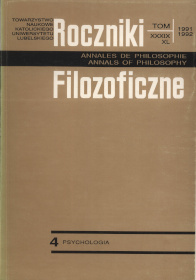Znak towarowy a percepcja wartości towaru. Eksperymentalne badania wyrobów
Abstrakt
The purpose of the work was to carry out an experimental study on the significance of the value of trademark in the perception of a particular type of trade goods. The subject-matter of the study consists of hypothetical situations in which people choose the same cars but labeled with the trademark of some highly valued firms, such as Peugeot, and those labeled with the trademark of less renown firms, eg. FSM.
The results of the experiments allowed, in the light of the cognitive-motivative conception of trademark, to present data from the point of view of the relation of similarity which was defined by the incidence of choices. From the letter the coefficient of the preference rate has been deduced. It has been reported that articles labeled in the same manner with the well-known and valuable trademark become more similar in the consumer’s cognitive representation than the articles with an unknown trademark, even if the articles in question seem to be barely similar. The results are very much in line with the contemporary investigations into the making of concepts. There is a tendency to blur the differences between trade goods and to make eminent their similar qualities in the process of forming the cognitive scheme.
The paper has also drawn out attention to some practical consequences of the obtained results. The latter refers to the use of norms concerning coming up against dishonest competition for the sake of the protection of trademarks. In view of the latter the methodology of research have been worked out would allow to decide the ability to differentiate trademark in the cognitive structure of the recipient. The empirical research embraces a very narrow range of the situations of choice. Despite that, in the light of the broad, taken in its adaptive approach, analysis of the market and of the psychological mechanisms which contribute to the making of a cognitive representation of trademark, those researches may be treated as an exemplification of general laws which define the relation between trademark and trade goods in the consumer’s reaction.
Bibliografia
Bilkey W. J., N e s E.: Country-of-Origin Effects on Products Evaluations. „Journal of International Business Studies” 13:1982 s. 89-99 (Śpring/Śummer).
Brooks L. R.: Decentralized Control of Categorization. The Role of Prior Processing Episodes. W:U. Neisser (ed.). Concepts and Conceptual Development. Ecological and Intellectual Factors in Categorization. Cambridge 1987 s. 141-174. Cambridge Unversity Press.
Bruner J. Ś., Postman L. J.: O spostrzeganiu niespójnosci: paradygmat. W: J. Ś. Bruner (red.). Poza dostarczone informacje. Warszawa 1978. PWN.
Erog u Ś. A., Machleit K. A.: Effect of Indyvidual and Product-Specific Variables on Utilising Country-of-Origin as a Product Quality Cue. „International Marketing Reviev” 6:1989 s. 27-41.
Falkowski A.: Multithreshold Decision Processin the Theory of Signal Defectability. „Polish Psychological Bulletin” 15:1984 s. 59-69.
Falkowski A.: Relacja podobietistwa w procesach poznawczych. Ekologiczne i informacyjne podejście w psychologii. Lublin 1990. RW KUL.
Getty D. J. i in.: On the Prediction of Confusion Matrices from Śimilarity Judgments. „Perception and Psychophysics” 26:1979 s. 1-19.
Gibson J. J.: The Ecological Approach to Visual Perception. Boston 1979. Houghton & Mifflin.
Johansson J. K.: Determinants and Effects of the Use of „Made in Labels”. „International Marketing Reviev” 6:1989 s. 47-58.
Johansson J. K., Douglas S. P., Nonaka I.: Assessing the Impact of Country of Origin on Product Evaluations: A New Methodological Perspective. „Journal of Marketing Research” 22:1985 (November) s. 388-396.
Konorski J.: Integracyjna działalność mózgu. Warszawa 1969. PWN.
Kozielecki J.: Psychologiczna teoria decyzji. Warszawa 1976. PWN.
Murphy G. L., M e d i n D. L.: The Role of Theories in Conceptual Coherence. „Psychological Reviev” 92:1985 s. 289-316.
Nosofsky R. M.: Attention, Similarity, and the Identification-Categorization relationship. „Journal of Experimental Psychology. General” 115:1986 s. 39-57.
Posner M. I., Keele S. W.: On the Genesis of Abstract Ideas. „Journal of Experimental Psychology” 77:1968 s. 353-363.
Rosch E.: On the Internal Structure of Perceptual and Semantic Categories. W: T. E. Moore (ed.). Cognitive Development and Acquisition of Language. New York 1973. Academic Press.
Skubisz R.: Prawo o rejestracji znaku towarowego i jego ochrona. Lublin 1988. UMCS.
Smith E. E., Medin D. L.: Categories and Concepts. Cambridge (MA) 1981. Harvard University Press.
Sung Tai Hong, Wyer R. S.: Effects of Country-of-Origin and Product Attribute Information on Product Evaluation: An Information Processing Perspective. „Journal of Consumer Research” 16:1989 s. 175-187.
Wai Kwan Li, Leung K., Wyer R. S.: Country-of-Origin Effects on Product Evaluations: The Role of Motivation and Information Load. University of Illinois 1991 (Manuscript Submitted for Publication)
Copyright (c) 1992 Roczniki Filozoficzne

Utwór dostępny jest na licencji Creative Commons Uznanie autorstwa – Użycie niekomercyjne – Bez utworów zależnych 4.0 Międzynarodowe.





